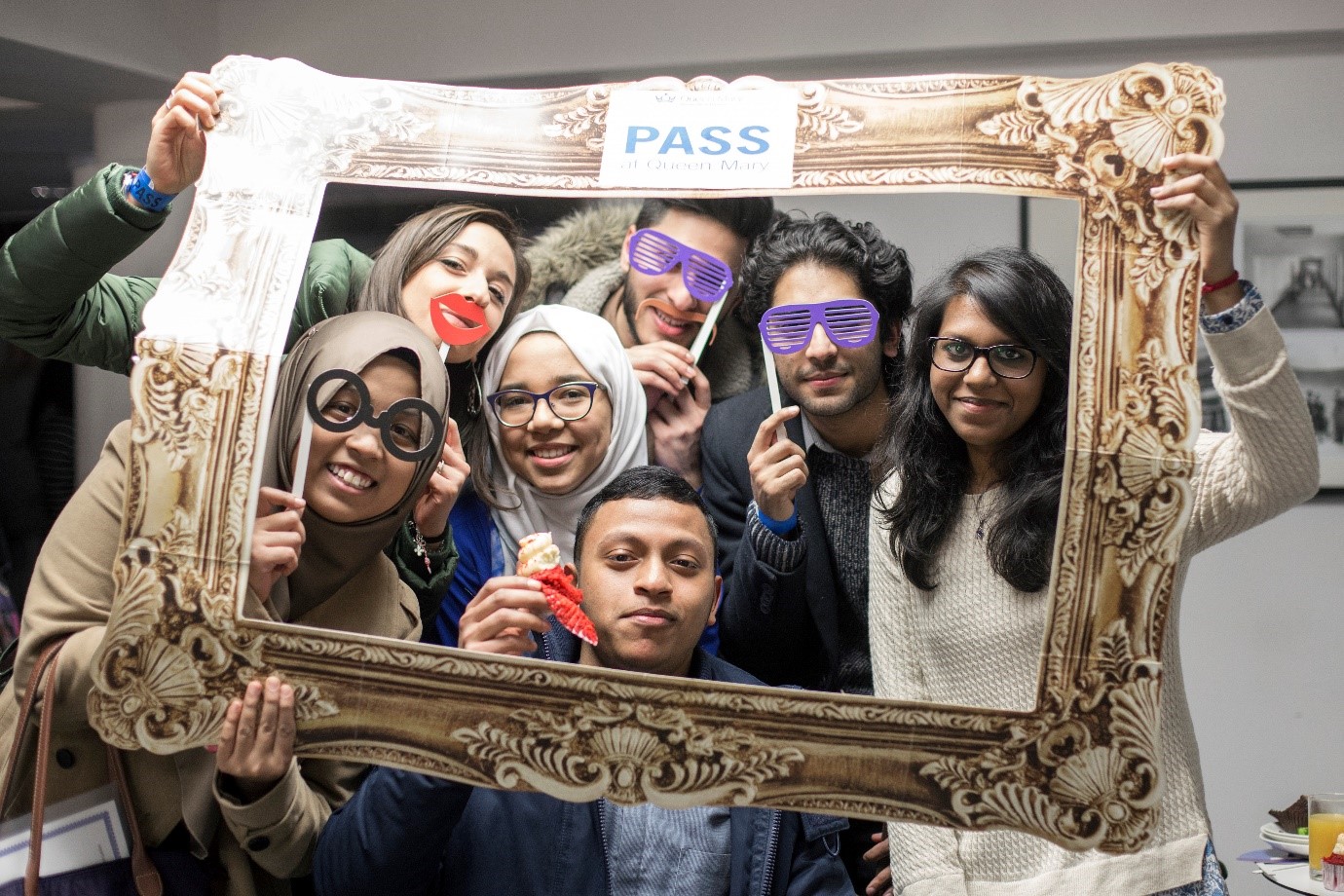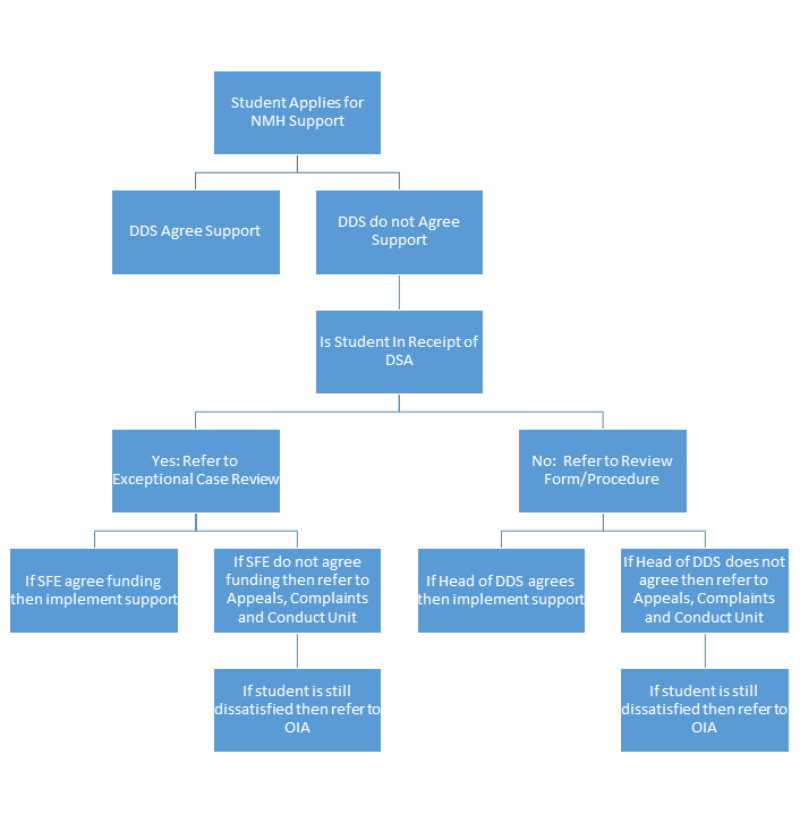Non-Specialist Human Support
Funding for what was once known as ‘Bands 1 and 2 Non-Medical Helpers’ Support’ was removed from the Disabled Students’ Allowance scheme some years ago for all but a few students, chiefly those with sensory impairment who may require a specialist note-taker.
Nevertheless, Queen Mary University of London has a legal obligation to anticipate the needs of its disabled students and to ensure that they receive appropriate reasonable adjustments.
The following information explains what forms of human support are available through QMUL’s Disability and Dyslexia Service and how to apply, should you think that this is something that your disability necessitates. It also explains the criteria which we use when making decisions about whether or not to provide a student with this form of support.
Role Summary:
- Note-taking support for taught sessions
- Book fetching service from the Library
- Practical Support Assistant
- Reader
- Examination Support
- Workshop / Laboratory Assistant
- Study Assistant
- Proof-reading
Also on this page:
- How to Apply
- What Happens Next?
- Our Data Protection Privacy Notice for DDS Users [PDF 98KB], which contains more information about how we use your data.
- Application for Provision of Non-Specialist Human Support - Online Application
- Application for Provision of Non-Specialist Human Support [downloadable form] [DOC 19KB]
Role: Note-taking support for taught sessions
Queen Mary University of London has a lecture capture system called Q-Review, which uses the Echo 360 recording system. Q-Review currently covers around 80% of lecture venues. The majority of students accessing the Disability and Dyslexia Service will be expected to utilise the recordings made on this lecture capture system; where recordings are not available DDS can loan students Digital Voice Recorders (DVRs), if they do not have a recording device of their own, e.g. a smart phone or a DVR provided through the Disabled Student’s Allowance.
When making decisions on whether a student will be provided with a human note-taker we will use the following criteria
- Students with sensory impairments which will prevent them from taking notes in lectures because they cannot see or hear the content
- Students with significant mobility issues, especially students with conditions affecting their upper limbs, that will affect their ability to either word process or hand-write notes
NB: we will not usually provide note-taking support for tutorials and seminars, but this can be discussed with your Disability Adviser.
Role: Book fetching service from the Library
The staff in QMUL’s Library Services are able to offer disabled students that require assistance with retrieving books and other learning materials a book fetching service.
The criteria for assessing whether we recommend this form of provision for students as follows:
- Students with visual impairments
- Students with disabilities which physically prevent them retrieving items from the library
If your DDS adviser has recommended that you have access to the book fetching service you will be allocated a named contact in the Public Services team within the Library. This person will then make themselves known to you via email.
When you wish to request the retrieval of any books you can email your named contact via their shared email address, with the following information:
- Name of the author
- Title of the book
- The edition
- Class mark where available
- The library that you wish to collect your books from, i.e. Mile End, Whitechapel or West Smithfield.
(If you do not provide all of this information, then the library may be unable to locate the book which you have requested).
Your named contact will then endeavour to make these books available within two working days; you will then be sent an email when the items are ready for collection. Items will be held with the HOLD books at the Welcome Desk in the library that you have nominated. Please note that if the book has to be requested from another site library this may delay the process.
Hold items will be kept for 5 working days. Failure to collect items will result in the books being returned to the shelves or put on hold for another user. If you cannot collect by the date stated in the email please let your Library Contact know. They may be able to offer an extension.
NB: Library Services staff will only be able to contact you using your QMUL email address.
You can request up to and including the maximum limits permissible on your course per week. You will have access to the same arrangements as other students supported by DDS, i.e. unlimited renewals and a waiver on fines up to the point where an invoice is raised for any fines.
NB: We can only guarantee to provide books and other learning resources held within the Library.
Role: Practical Support Assistant
When making decisions on whether a student will be provided with a practical support assistant we will use the following criteria:
- Students with visual impairments that affects their mobility; NB: Sighted Guides can be provided through the DSA
- Students with significant mobility issues, e.g. wheelchair users
NB: social support for students with conditions on the autistic spectrum will be provided through a variety of sources, e.g. the Peer Assisted Study Support system. See here for more information regarding study assistance.
Role: Reader
QMUL has site licences for specialist software programs such as JAWS, ZoomText and ClaroRead. We would expect these programs to provide students who require speech output the support which they seek to read text aloud. As such, it is unlikely that we will agree to provide students with a human reader. For more information please contact one of our Disability Advisers.
Role: Examination Support
QMUL’s various Schools and Departments will provide any scribing, amanuensis and reader support as required. The role of the Disability and Dyslexia Service is to recommend the provision of such support. .
Role: Workshop / Laboratory Assistant
When making decisions on whether a student will be provided with a workshop or laboratory assistant we will use the following criteria:
- Students with visual impairments that affects their mobility; NB: Sighted Guides can be provided through the DSA
- Students with significant mobility issues, e.g. wheelchair users
- Students with fine motor control issues*
*For students with Dyspraxia, please discuss the possible provision of this support with your Disability Adviser. If this is requested, we will consult the findings of your diagnostic report when making a decision on whether it is appropriate.
Role: Study Assistant
Queen Mary University of London has an array of peer support mechanisms for students, including:
The Peer Assisted Study Support scheme

PASS is a course-based mentoring scheme, run for students by students. It gives first-years (and sometimes second-years) the opportunity to discuss study-related problems in a friendly, informal setting and get general advice from higher-year undergraduates in their subject.
Queen Mary Students’ Union (QMSU) Buddy Scheme
The Students’ Union Buddy Scheme helps incoming students settle into life at QMUL by matching first year students (mentees) with current students (mentors) who provide informal support through regular meetings, and sharing their experiences and tips. Mentors and mentees are matched based on their school and indicated preferences to ensure that each student gets the most out of their first year at Queen Mary as possible. The scheme offers the opportunity to make new friends from all walks of life and to be a part of something that celebrates diversity in an informal, fun and sociable way.
QMUL's Academic Skills Enhancement service offers a range of support for developing academic skills including academic writing, revision and exam skills and referencing. The service offers one to one sessions, workshops and has a range of self-access resources.
Free and impartial guidance in maths and statistics is available every weekday during term time on a drop-in basis. Specialist tutors give advice on how to understand the subject, develop an overview of the topic and tackle general problems.
Writing tutorials with the Royal Literary Fund Fellows (again within the Academic Skills Enhancement service).
Services for Students with Conditions on the Autistic Spectrum (ASC)
The Disability and Dyslexia Service also runs a two day ASC induction session just before the start of the academic year in September to help students with ASC ease into university life, access important enrolment information and make friends before the semester gets underway.
Role: Proof-reading
Students with SpLDs are expected to utilise the service’s Specialist One to One Study Skills Tutors to develop their own proof-reading techniques, in tandem with the specialist software available on the university teaching service (ClaroRead) and/or any assistive software provided through their Disabled Students' Allowance.
The Disability and Dyslexia Service also provide students with a SpLD Cover Note to submit with their summative assessments which advises those marking their work on the typical issues faced by students with SpLDs.
As such, we do not offer human proof-reading support.
How to Apply
- Application for Provision of Non-Specialist Human Support - Online Application
- Application for Provision of Non-Specialist Human Support [downloadable form] [DOC 19KB]
- Our Data Protection Privacy Notice for DDS Users [PDF 101KB] contains more information about how we use your data.
Application for Provision of Non-Specialist Human Support: What happens next?
Once you have submitted your application for Non-Specialist Human Support it will passed to one of our advisers who will usually contact you within 10 working days; however, outside of term time this may take slightly longer.
In making their decision the Disability Adviser may request to meet with you to clarify your requirements.
Decisions will be communicated via email.

A PDF copy of the Flow Chart for Requests for NMH Support is available here. [PDF 107KB]
If you are satisfied
If you satisfied with the outcome of your application for Non-Specialist Support the Disability Adviser will be in contact to assist you in implementing this support, as appropriate.
If you are not satisfied
If you are not satisfied with the outcome of your application you can request that the decision is reviewed. To do this, please complete the Non-Specialist Support review form [DOC 559KB], and return it to our office (Room 3.06, Francis Bancroft Building). Alternatively you could print, sign and scan it and email your form to DDS. This will be reviewed by the Head of the Disability and Dyslexia Service.
A PDF copy of the Flow Chart for Requests for NMH Support is available here. [PDF 107KB]
Exceptional Cases
If you are a student entitled to a Disabled Student’s Allowance provided by Student Finance England (SFE) there is an “Exceptional Cases” process that may be able to pay for the support on an interim basis while an appeal against the decision we have made is being resolved. SFE have created a ‘Support Request Form’ for this eventuality that needs to be completed; for more information please ask your Disability Adviser.
If you remain dissatisfied
If there is a disagreement between ourselves and Student Finance England as regards whether or not we should be expected to provide the Non-Specialist Human Support that a student has requested then the Office for the Independent Adjudicator can handle a potential appeal. However, we would always seek to resolve any appeals internally and as such, this is not a situation we anticipate happening on a regular basis.
QMUL’s Appeals, Complaints and Conduct Unit can be contacted using the following methods of communication
- Email Appeals, Complaints and Conduct Unit
- +44 (0) 207 882 3457